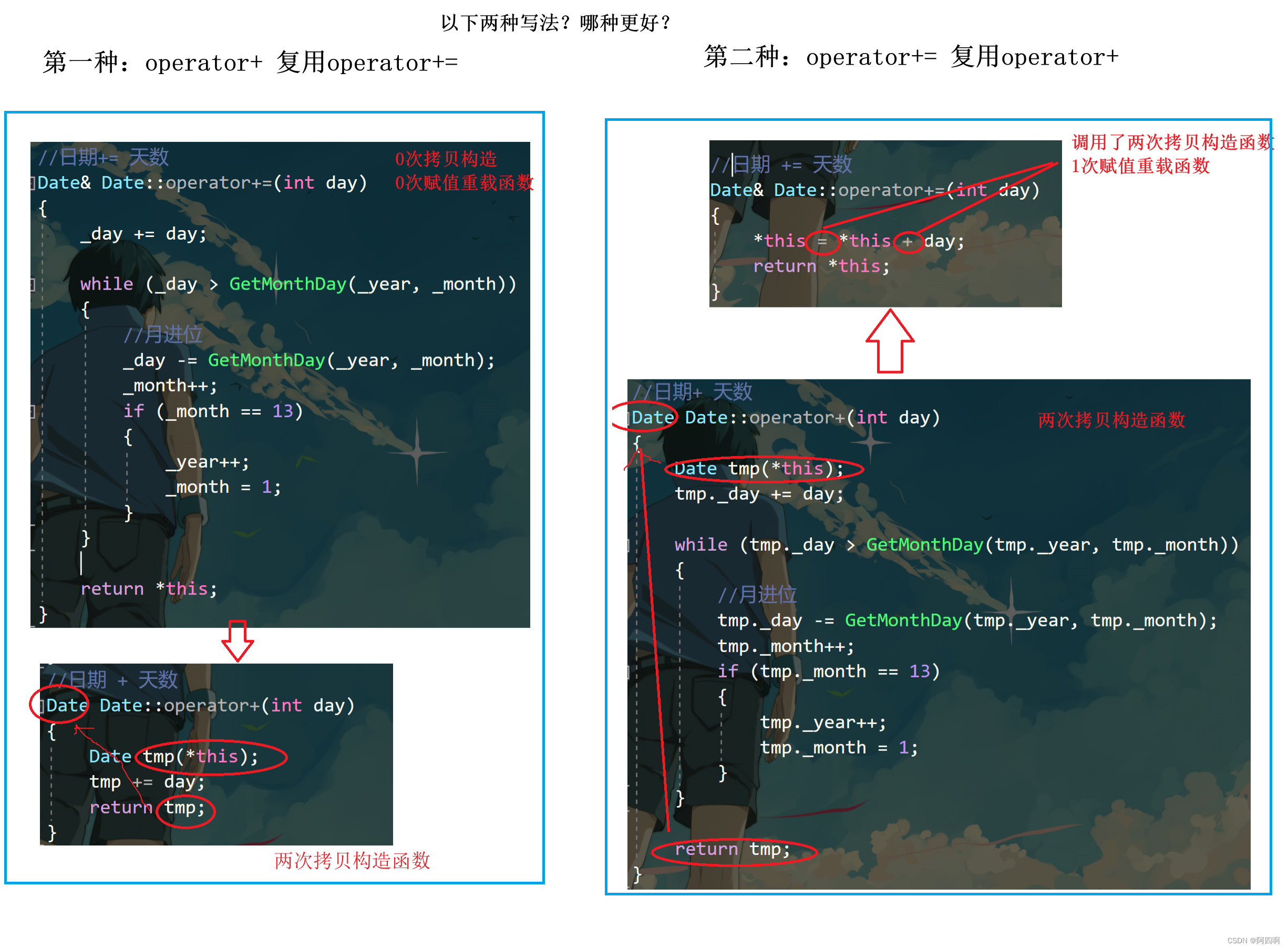👻内容专栏: C/C++编程
🐨本文概括: C++实现日期类。
🐼本文作者: 阿四啊
🐸发布时间:2023.9.7
对于类的成员函数的声明和定义,我们在类和对象上讲到过,需要进行声明和定义分离。
一些需要使用的接口函数声明,我们放入到Date.h文件中
#include <iostream> using namespace std; class Date { public: //构造函数 Date(int year = 1, int month = 1, int day = 1); //拷贝构造函数 Date(const Date& d); //析构函数 //~Date(); //日期类可以不写 //打印日期 void Print()const; //运算符重载 bool operator<(const Date& d) const; bool operator==(const Date& d) const; bool operator<=(const Date& d) const; bool operator>(const Date& d) const; bool operator>=(const Date& d) const; bool operator!=(const Date& d) const; //赋值运算符重载 Date& operator=(const Date& d); //日期+= 天数 Date& operator+=(int day); //日期 + 天数 Date operator+(int day) const; //日期 -= 天数 Date& operator-=(int day); //日期 - 天数 Date operator-(int day) const; //获取当月天数 int GetMonthDay(int year, int month) const; //前置++ Date& operator++(); //后置++ Date operator++(int); //前置-- Date& operator--(); //后置-- Date operator--(int); //日期 - 日期 返回天数 int operator-(const Date& d) const; private: int _year; int _month; int _day; };
🤗🤗下面,我们对一些日期接口函数的实现:
实现于Date.cpp文件中
一、构造函数、拷贝构造以及日期的打印
#include "date.h" //构造函数 Date::Date(int year, int month, int day) { _year = year; _month = month; _day = day; //检查日期是否合法 if (month < 1 || month > 12 || day < 1 || day > GetMonthDay(year, month)) { cout << "非法日期" << endl; //exit(-1); } } Date::Date(const Date& d) { _year = d._year; _month = d._month; _day = d._day; } //Date::~Date() //{ // cout << "~Date()" << endl; //} void Date::Print() const { cout << _year << "年" << _month << "月" << _day << "日" << endl; }
二、赋值运算符重载函数
//赋值运算符重载 Date& Date::operator=(const Date& d) { if (this != &d) { _year = d._year; _month = d._month; _day = d._day; } return *this; }
三、运算符重载
比较运算符重载
我们写一个operator< 运算符重载函数和一个 operator== 运算符重载函数即可,其他直接复用就行。
bool Date::operator<(const Date& d) const { if (_year < d._year) { return true; } else if(_year == d._year && _month < d._month) { return true; } else if (_year == d._year && _month == d._month && _day < d._day) { return true; } else { return false; } } bool Date::operator==(const Date& d) const { return _year == d._year && _month == d._month && _day == d._day; } bool Date::operator<=(const Date& d) const { return (*this < d) || (*this == d); } bool Date::operator>(const Date& d) const { return !(*this <= d); } bool Date::operator>=(const Date& d) const { return (*this > d) || (*this == d); } bool Date::operator!=(const Date& d) const { return !(*this == d); }
日期 ± 天数、日期 - 日期
获取当前月份的天数
首先我们需要写一个获取当月的天数GetMonthDay()函数,以便于后面用日期 ± 天数运算。
//获取当月天数 int Date::GetMonthDay(int year, int month) const { static int MonthDayArray[13] = { 0, 31, 28, 31, 30, 31, 30, 31, 31, 30, 31, 30, 31 }; //判断是否为闰年(先判断是否为2月) if (month == 2 && ((year % 4 == 0 && year % 100 != 0) || (year % 4 == 0))) { return 29; } return MonthDayArray[month]; }
日期 += 天数 与 日期 + 天数
//日期+= 天数 Date& Date::operator+=(int day) { if (day < 0) { return *this -= -day; } _day += day; while (_day > GetMonthDay(_year, _month)) { //月进位 _day -= GetMonthDay(_year, _month); _month++; if (_month == 13) { _year++; _month = 1; } } return *this; } //日期 + 天数 Date Date::operator+(int day) const { Date tmp(*this); tmp += day; return tmp; } 日期+ 天数 //Date Date::operator+(int day) //{ // Date tmp(*this); // tmp._day += day; // // while (tmp._day > GetMonthDay(tmp._year, tmp._month)) // { // //月进位 // tmp._day -= GetMonthDay(tmp._year, tmp._month); // tmp._month++; // if (tmp._month == 13) // { // tmp._year++; // tmp._month = 1; // } // } // // return tmp; //} // 日期 += 天数 //Date& Date::operator+=(int day) //{ // *this = *this + day; // return *this; //}
日期 -= 天数 与 日期 - 天数
我们知道了先写operator+=,再写operator+直接复用即可这种方法更优,所以我们日期减去天数也是实现operator-=,再实现operator-
//日期 -= 天数 Date& Date::operator-=(int day) { if (day < 0) { return *this += -day; } _day -= day; while (_day <= 0) { _month--; if (_month == 0) { _year--; _month = 12; } _day += GetMonthDay(_year, _month); } return *this; } //日期 - 天数 Date Date::operator-(int day) const { Date tmp(*this); tmp -= day; return tmp; }
自增 和 自减 重载
C++规定:前置++和后置++都是一元运算符,为了让前置++与后置++形成能正确重载,后置++重载时多增加了一个int类型的参数,与前置++构成函数重载,以区分前置++
//前置++ Date& Date::operator++() { *this += 1; //返回++之后的值 return *this; } //后置++ Date Date::operator++(int) { Date tmp(*this); //返回++之前的值 *this += 1; return tmp; } //前置-- Date& Date::operator--() { *this -= 1; return *this; } //后置-- Date Date::operator--(int) { Date tmp(*this); *this -= 1; return tmp; }
日期 - 日期
// d1 - d2 int Date::operator-(const Date& d) const { //默认认为左边日期大 Date max = *this; Date min = d; int flag = 1;//为1返回正数,-1返回负数 int count = 0;//统计天数 //不成立则交换 if (*this < d) { max = d; min = *this; flag = -1; } //while(min < max) while (min != max) { min++; count++; } return count * flag; }
四、全局函数实现流插入流提取
date.h 流插入流提取重载函数的声明
/*不能重载成成员函数,否则会导致参数不匹配,因为this指针永远占据第一个位置,无法进行流插入提取操作。*/ //流插入 ostream& operator<<(ostream& out, const Date& d); //流提取 istream& operator>>(istream& in, Date& d);
如果重载成成员函数,那么成员函数的第一个参数永远是隐藏的this指针,成员函数中只能利用out << _year << _month << _day的顺序,但是在调用时, (d1为日期类对象)d1 << cout,只能这么写,虽然可以,但是很别扭,不符合使用习惯和价值。所以我们需要实现成全局函数才可以。
但是写成全局函数会访问类的成员变量,我们可以利用友元或者将成员变量封装成成员函数解决。
date.cpp 流插入流提取重载函数的实现
/*不能重载成成员函数,否则会导致参数匹配,因为this指针永远占据第一个位置,无法进行流插入提取操作。*/ //涉及访问私有成员变量可以利用友元,或者将成员变量封装成Get成员函数 //流插入 ostream& operator<<(ostream& out, const Date& d) { out << d._year << "年" << d._month << "月" << d._day << "日" << endl; return out; } //流提取 istream& operator>>(istream& in, Date& d) { in >> d._year >> d._month >> d._day; }





